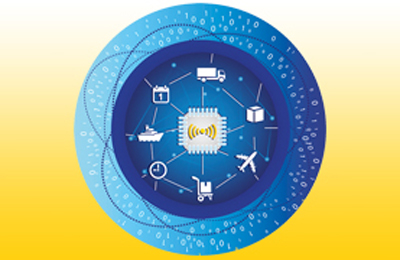
IoT ...... projected to generate $8 trillion globally over the next decade
Internet of Things to deliver $1.9 trillion for logistics sector
SINGAPORE, April 21, 2015
Internet of Things (IoT) is set to generate $8 trillion worldwide in value at stake, including $1.9 trillion for supply chain and logistics, over the next decade through new connections, according to a report.
The Cisco economic analysis pointed out that it will come from five primary drivers - innovation and revenue ($2.1 trillion), asset utilisation ($2.1 trillion), supply chain and logistics ($1.9 trillion), employee productivity improvements ($1.2 trillion) and enhanced customer and citizen experience ($700 billion).
A new Trend Report, which was recently released by leading logistics service provider DHL and IT leader Cisco, estimated that there will be 50 billion devices connected to the Internet by 2020 compared to 15 billion today.
It looked at the potential impact this technological revolution will have on business.
The value at stake, combination of increased revenues and lower costs that is creates or will migrate among companies and industries when new connections are made, revealed the huge potential when the Internet and networks expand their connections to warehousing, freight transportation and other elements of the supply chain.
For any organisation with a supply chain or logistics operations, IoT will have game-changing consequences, from created more ‘last mile’ delivery options for customers, to more efficient warehousing operations and freight transportation, said the report.
Over the next decade, the logistics industry could unlock higher levels of operational efficiency as the IoT connects in real times millions of shipments being moved, tracked and stowed each day, it said.
In warehousing, connected pallets and items will be a driver for smarter inventory management. In freight transportation, tracking and tracing of goods becomes faster, more accurate, predictive and secure while analytics of a connected fleet can help to predict asset failure and to schedule maintenance checks automatically.
Finally, connecting delivery personnel with surrounding vehicles and people can become a way of monetising and optimising the return trip to improve efficiency and service in last mile delivery. For customers, this means DHL can provide an even faster, more reliable and cost-effective service.
Ken Allen, chief executive officer, DHL Express and Board Sponsor Technology, said: "At Deutsche Post DHL Group, we have a deeply held belief in the positive powers of global trade. Yet, as our Global Connectedness Index 2014 revealed, the overall level of global connectedness remains surprisingly limited.
“There is huge potential for countries to further increase their connectedness and prosper through trade, integration and technology. We believe the Internet of Things will be a primary enabler of this global transformation."
Chris Dedicoat, president, EMEAR for Cisco, said: ”Digital disruption is all around us and it's having massive implications for business. Digitisation and the expansion of the Internet of Things is a catalyst for growth, which is driving new economic models and enabling organisations to remain competitive and embrace the pace of change happening globally.
“This report clearly demonstrates that digitisation and the IoT will deliver long term efficiencies and growth opportunities across a wide range of industries.”
Cisco Consulting Services and DHL are also collaborating on a joint IoT innovation project that will improve decision-making in the warehouse operations through near real-time data analytics based on Wi-Fi location data of selected devices.
The solution is based on Cisco's Connected Mobile Experiences (CMX) which uses the high-density wireless network to collect aggregate location data on Wi-Fi connected devices. - TradeArabia News Service







